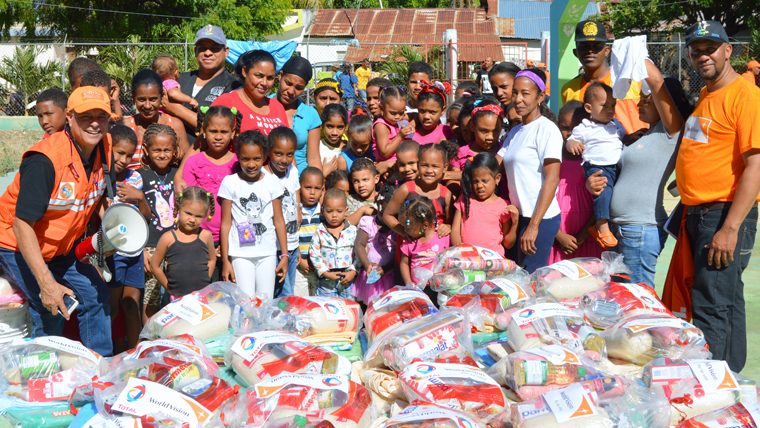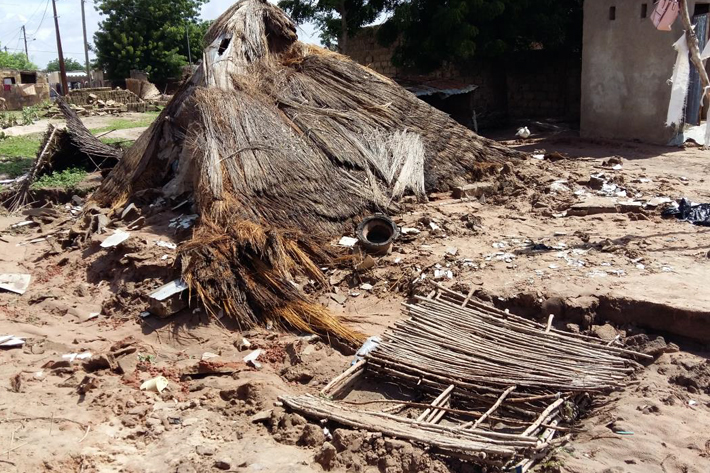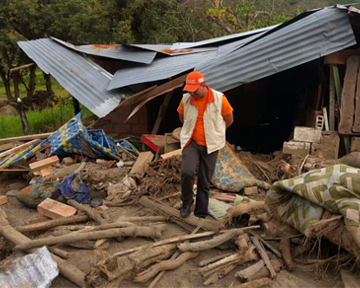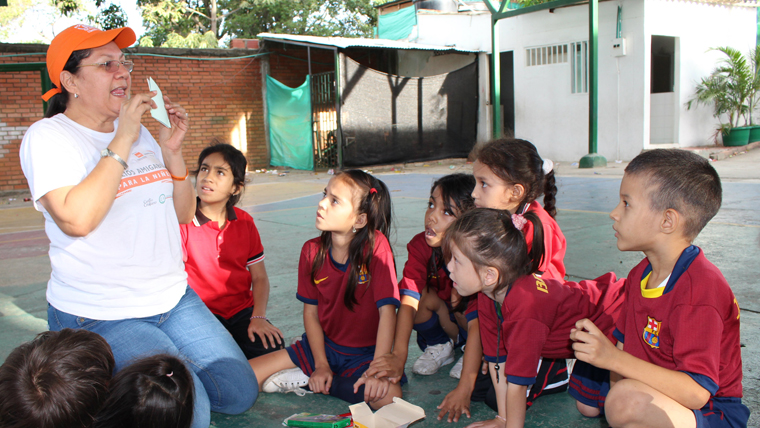Other Past Emergencies
FLOODING IN DOMINICAN REPUBLIC
After the impact of Hurricane Matthew, some areas of the Dominican Republic saw more than a metre of rainfall in a month. By the end of November 2016, 14,201 people were displaced, 337 people were in official shelters and 40 communities were still inaccessible, with 2,839 houses affected (the Center for Emergency Operations).

Our Response
World Vision and ADRA, a local partner, supported the distribution of hygiene kits to more than 1000 people in two locations. The kits included soap, water purification tablets, mosquito nets and toilet paper. These households also received important information about water, sanitation and disease prevention.
FLOODING IN SENEGAL
During July 2016 many regions across Senegal received heavy rainfall which led to flooding in areas including Kaffrine, Matam and Kaolack in the central and northern parts of the country, Velingara in the south and recently Dakar.
The extensive damage wrought by these devastating rains has affected more than 10,000 people. Families have been driven from their homes and many hectares of fields have been destroyed, threatening harvests, the livelihoods of farmers and the food stocks of a thousand homes. Floods have become more severe in recent years, with emergency events in 2009, 2012 and 2013.

Photo: The extensive damage wrought by these devastating rains has affected more than 10,000 people.
What have we done to help?
With support from the Start Fund, we've distributed aid kits (containing soap, a kettle, bleach, liquid detergent, cloths and a basin) to flood victims. Also, 10,000 of the most vulnerable people - those who have lost their homes and means of subsistence - will receive cash assistance to rebuild their homes and lives, and to meet their most urgent needs.
Sokhna, whose home was damaged by the floods, described the situation to us: "When the rain started it was 11am and I was in the middle of cooking. My pot was carried away by the waters and the wall of our house fell in. All of my peanut seed was also washed away. We have nothing left to sleep on, and a neighbour has even had to lend me the clothes I'm standing up in. World Vision's health kits are going to come in very handy for keeping us healthy and keeping the children clean and free from disease."
The rains reached the village and ravaged the houses, destroying the harvest and our food reserves. 124 huts and houses have been flattened and the electricity poles have been downed. All thanks go to World Vision for intervening because sanitation has become our top priority in this situation.
- Ousmane Ndao, Ainouma village head
As part of our response we've also been raising awareness of the correct hand washing techniques which are important to protect adults and children from disease, particularly while the remaining standing water increases the risks of cholera and malaria.
MONGOLIA DZUD EMERGENCY
Mongolia has one of the coldest climates in the world, with temperatures dropping below -40ºC for several months each year accompanied by extremely heavy snowfall.
The exceptionally harsh 2015/16 winter has killed livestock and put a strain on thousands of herders across the country. This situation, known locally as a dzud, has affected 225,800 people in 211 districts - the equivalent of 41 per cent of the total herder population in Mongolia.
As part of our overall response to the emergency, through the Start Fund, we've helped 2,125 herder families or 8,500 individuals in 15 districts.
• 675 food packages and 550 animal health kits were distributed.
• 2,000 handbooks were printed and distributed to herders with traditional and basic methods to care for weak animals, including herbal methods that can be prepared at home and used to protect animals from harsh weather condition and chronic diseases.
FLOODING IN INDIA
In November and December 2015, the Indian state of Tamil Nadu saw sustained, heavy rainfall and strong winds. The resulting floods caused landslides and widespread destruction across the region, including the city of Chennai.
The worst affected area was the Cuddalore district where:
• at least 32 people were killed
• 29,000 people were evacuated
• 25,000 homes were destroyed
• a further 53,139 homes were damaged
• fields were flooded and crops and livestock lost
• roads were blocked and the electricity supply was disrupted.
What have we done to help?
We been worked with families and communities across Cuddalore district, and helped to meet people's immediate needs.
We gave relief packs - which included food, hygiene supplies and shelter kits - to 695 of the most vulnerable families (2,501 people).
We also looked at vulnerability and resilience; ways to reduce the risks from flooding to people and property in the future.
COLOMBIA LANDSLIDES
 On 18 May 2015, the banks of the river Liborianain Antioquia, Colombia, burst due to heavy rainfall. This triggered a landslide which caused major damage to some villages and a built-up urban area situated on a 40km-long stretch of land along the river. More than 1,200 people were directly affected as their houses were damaged or destroyed, and were relocated to shelters and private residences (houses of friends and families). Child Protection and Education are two priority areas of need that were identified.
On 18 May 2015, the banks of the river Liborianain Antioquia, Colombia, burst due to heavy rainfall. This triggered a landslide which caused major damage to some villages and a built-up urban area situated on a 40km-long stretch of land along the river. More than 1,200 people were directly affected as their houses were damaged or destroyed, and were relocated to shelters and private residences (houses of friends and families). Child Protection and Education are two priority areas of need that were identified.
What has World Vision done to help?
With help from Start Fund, we were able to support those affected by the landslide in several ways. This included setting up four Child Friendly Spaces (CFS), where we offered children and adolescents psychosocial support, involving parents, caregivers, teachers, youth volunteers, partners and local authorities in the process. In total 609 children between the ages of 5 and 14 years took part in the activities offered at the centres. In addition 80 parents attended workshops we ran that looked at ways in which they can ensure the well being of their children through this time of upheaval. We also provided school kits for children enrolled in primary schools affected by the landslide and plastic boots and raincoats to the children living in the most affected rural areas.
COLUMBIA-BORDER CLOSURE CRISIS
In August the border between Colombia and Venezuela was closed. Following the subsequent deportation of Colombians living in Venezuela, the Colombian Government launched a humanitarian response to ensure children affected by the crisis are protected and have their right to education guaranteed.

What has World Vision done to help?
World Vision, in partnership with Start Fund, scaled up efforts to meet immediate short-term needs, through the promotion of children's rights. In those first weeks we were able to support children in three Child Friendly Spaces (CFS), involving parents, caregivers, teachers and local partners in the process. Child Friendly Spaces provided a safe, active environment for children and adolescents affected by the emergency. The CFS also promoted children's physical, social, and emotional recovery, through psychosocial support. In total, 669 school-aged children between 5 and 14 years of age took part in the CFS activities in three educational institutions. Further, 220 parents and caregivers participated in activities that helped them reflect on the rights and duties of children, parenting guidelines and good family communication. Teachers received Education in Emergencies training, with the support of the Norwegian Refugee Council, plus training on Child Protection in Emergencies. In addition, food stamps were delivered to 350 families affected by the crisis.
MALI CONFLICT
May and June 2015 saw renewed fighting between armed groups in areas of northern Mali, which has forced over 60,000 people to head to the safety and shelter of the south. Those who have fled join the 43,000 people already displaced throughout the country since the conflict began in 2012. According to UNHCR, the total number of people who've been forced to leave their homes now stands at around 100,000 inside Mali, mainly in the northern part of the country, along with a further 136,000 (OCHA) people who have fled to neighbouring countries.
Children and families who have recently fled are in dire need of immediate food assistance, drinking water, hygiene items, mosquito nets, blankets, kitchen hardware and clothing. The rainy season, which started in June, worsened the situation, making dry shelter and good hygiene and sanitation more difficult. Much of the region is also prone to flooding due to the proximity of the Niger river, making access to help that much harder.
What has World Vision done to help?
With funding from Start Fund, World Vision has been able to distribute much needed essential items including mosquito nets, blankets, LED and Solar torches, antiseptic soaps and water purifying tablets to 883 households. These items are improving living conditions and will help to protect families against disease.
THANK YOU
Since 1 October 2014 you've helped us raise over £38,808 for our emergency work.
This enables us to be better prepared when emergencies strike, so we can save more lives of children in the world’s hardest places.
